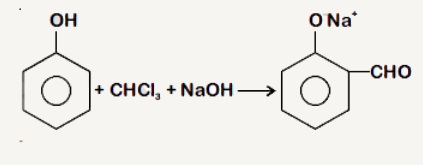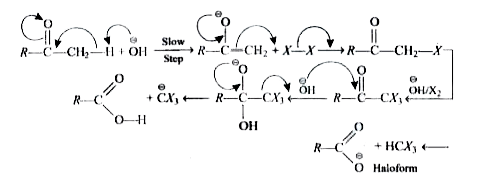In the reaction

The electrophile involved is
a.Dichloromethyl anion
b.Formly cation
c.Dichloromethyl cation
d.Dichlorocarbene
A
Dichloromethyl anion
B
Formly cation
C
Dichloromethyl cation
D
Dichlorocarbene
Video Solution
Text Solution
The correct Answer is:D
It is Reimer-Tiemann reaction, The electrophile formed is : (Dichlorocarbene) according to the following reaction
|
Similar Questions
Knowledge Check
The IUPAC name for CH3−O∣∣C−CH2−CH2−O∣∣C−OH is ______.
A1-hydroxypentane-1,4-dioneB1,4-dioxopentanolC1,carboxybutan-3-oneD4-oxopentanoic acidCompound having −O∣∣C−CH3 group reacts rapidly with halogen in presence of a base to form haloform. The reaction is known as haloform.
R−O∣∣C−CH3X2+ϴOH−−−−→R−O∣∣C−ϴO+CHX3
Mechanism

Consider the following reactions:
Reaction I →Ph−O∣∣C−CH3Cl2,ϴOH−−−−→Ph−O∣∣C−ϴO+CHCl3
Reaction II →Ph−O∣∣C−CD3−Cl2,ϴOH−−−−→Ph−O∣∣C−ϴO+CDCl3
Which of the following is correct comparison of the rate of reaction I and II?ArI>rIIBrI>rIICrI=rIIDCannot be determinedCH3−O∣∣C−H and Ph−O∣∣C−H can be differentiated by :
ATollen's reagentBFehling's solutionCLucas reagentDVictor meyer's test
In the given reaction
R−O∣∣C−OH[X]−−→R−O∣∣C−O−CH3
[X] will be:
View SolutionIn a reaction,
ANH3−−→Bheat−−→CP2O5−−→C2H5CN
(A), (B) and (C) are :
View SolutionPredict product of following reaction,
H3C−O∣∣C−O−C2H5NaBH4−−−−→
View SolutionH−O∣∣C−OH and H3C−O∣∣C−OH can be distinguished by:
View SolutionH3C−CH2−O∣∣C−CH3ϴOD/D2−−−−→ Final product is
View Solution
